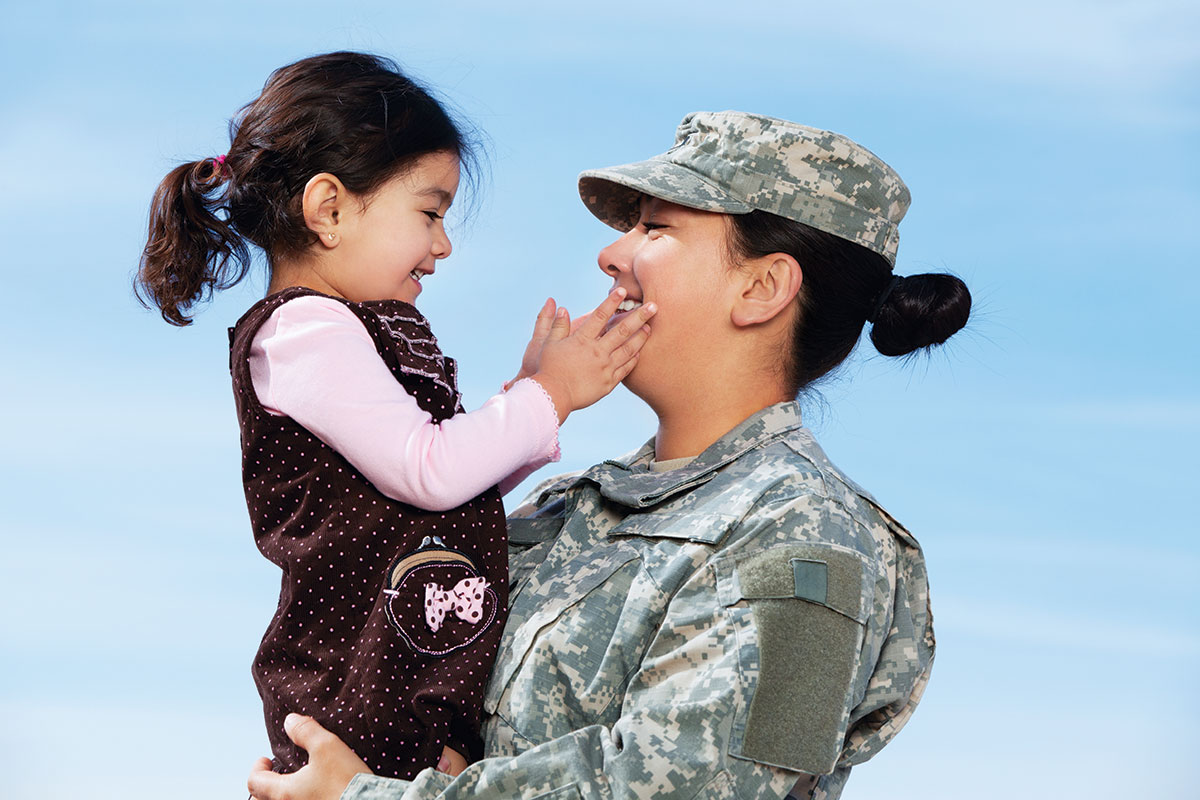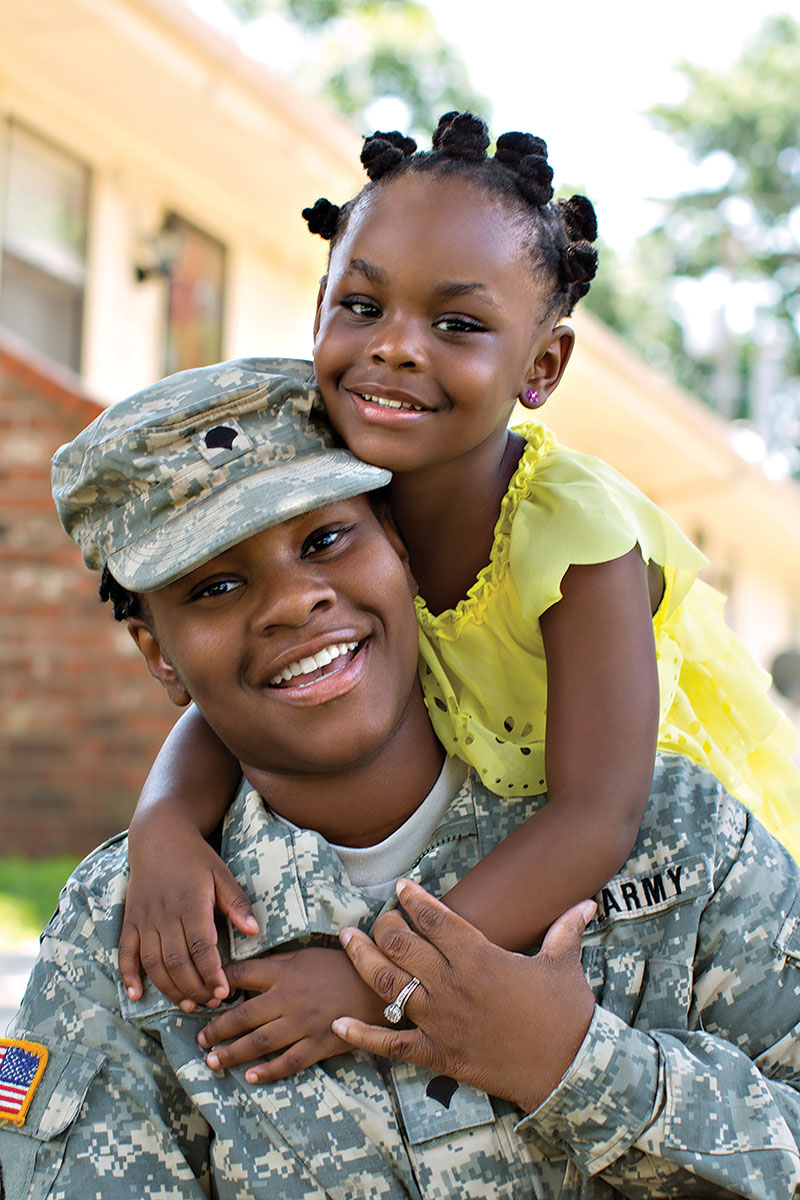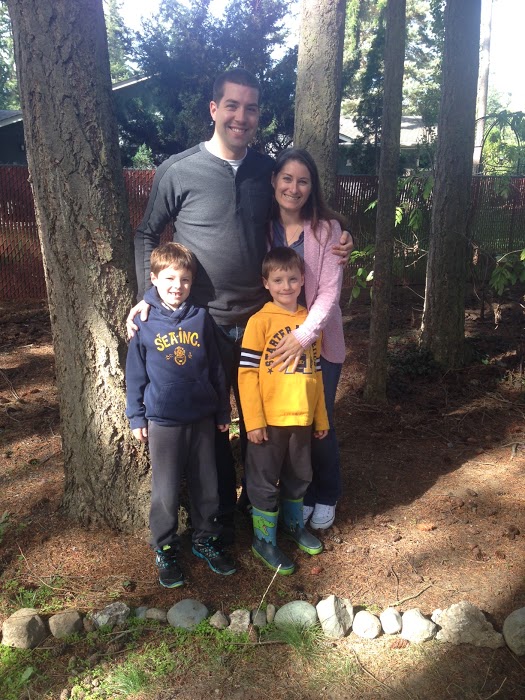
Mismatched family schedules, long work trips, financial stress and crazy work hours: sounds like modern American family life, right? But add in the risk of injury or death in the workplace and a strict culture of conformity, and you’ve got the life of a family in the armed forces.
Many jobs carry risks and require travel, but what other group of employees commit as much of themselves and their families to an at times structured, at other times erratic, lifestyle — one that often seems to inhabit a near total blind spot in the eyes of their civilian neighbors?
Unless we are “at war” (the prolonged war in Afghanistan officially ended in 2014), the general public has little reason to think about the experiences of families that make up the U.S. military force. Not just the service members but the spouses, partners and kids living this life.
“It’s a lonely place to be,” says Rachel Starnes, the wife of a Navy pilot and mother of two young sons, currently living in Key West, Florida. Starnes’ book, The War at Home: A Wife’s Search for Peace (and Other Missions Impossible), was released in July and explores the challenges of marriage and motherhood in a military family.
“Your spouse is gone, not just their person but their heart and soul; their mind is consumed with the mission,” Starnes says. She writes of a life on various bases while trying to define her own career and identity in the off-base, civilian world when her husband is deployed. The reality is that the military is not simply a job; it’s an all-encompassing lifestyle that both isolates and unifies.
Military families, despite common challenges of a life in service, remind us that they are not homogenous. Their stories, politics, struggles and experiences vary wildly, just like all families. And yet, family life in the military is different. They urge the rest of us not to forget about them.

Military life in the Pacific Northwest
The United States military is made up of the Army, Navy, Air Force, Marines and Coast Guard. The current national active-duty population is about 1.3 million total, according to 2016 Department of Defense (DoD) data. Washington state hosts seven military bases, with the seventh-largest military population in the country, totaling nearly 66,000 active-duty and reserve members.
And the military is full of families with kids. Fifty-six percent of those serving on active duty are married, and 44 percent have dependent children. While women make up only about 15 percent of active-duty forces, they comprise 95 percent of military spouses.
Whether serving or supporting her military spouse or partner, a woman with children is challenged by the obligation of her partner’s months-long training, deployment and the mobility needed for military career advancement. For a female soldier who is a single parent, her options are even more limited, as her duty may take her away from family networks that provide child-care support for civilian single parents.
For military spouses, frequent moving might mean underemployment compared to their civilian counterparts (43 percent unemployed versus 25.5 percent unemployed for civilian spouses). Yet despite these challenges, the Washington families we met share a common commitment to the military, which has given them both purpose and a community over the long run.
Creating connections
Fostering strong community among the military’s families creates better outcomes for morale. Each base or post organizes spouse groups, which are affiliated with a specific unit. A group’s purpose is to assist families throughout the deployment process. Many of the activities are on base, however, so those who live elsewhere might not have easy access.
Some military spouses are creating social groups of their own: Anne Cone is the coordinator of the Fort Lewis Mothers of Preschoolers (MOPS) meet-up and Facebook groups, which serve all types of families, including ones with mom service members, dad service members and families headed by same-sex couples.
“We are a military MOPS, and almost every base around the world has (or has had) a group like ours,” she explains. “We serve anyone who holds a DoD ID card — any branch of the military [and] retirees. We don’t ever ask for rank in our meetings because we are all mothers and that is what connects us. Rank has no place with us.”
Other parents’ groups at Joint Base Lewis-McChord (JBLM) specifically serve parents of children with special needs, and another serves parents of children on the autism spectrum.
But not everyone feels totally represented among the community. Neither same-sex couple I approached for this story would speak about their experience on the record for fear of additional visibility. They both say they feel that discrimination against gay people is still persistent in the military, and they say they do not want to make themselves targets.
In time for this season of reflection and community, we set out to meet military families in our region that represent a range of experiences, diversity of demographics and different career stages. We spoke to spouses, service members, children and two mothers who were formerly in the military. They all have stories to tell; we invite you to meet them, too.

Alaina Bezold and Lt. Matt Bezold
Oak Harbor, Whidbey Island
The Oak Harbor home of the Bezold family is situated on a quiet cul-de-sac several miles from the naval base where Matt is a weapons systems officer, or “goose,” as he explains. He is the officer sitting behind the pilot of an EA-6B Prowler, controlling the electronic shield that protects a squadron.
The complex lingo of the military becomes a running joke during the interview with Matt and Alaina, both 33 and parents of twin 7-year-old boys, Lucas and Bradley, and 2-year-old Henry. As I arrive, the boys are sitting down to lunch, stealing glances at me with smiling eyes, as their welcoming dog, Pongo, licks my hand.
The Bezolds were neighbors of Starnes and her husband at Naval Air Station Lemoore in California and feel Starnes’ honest portrayal of military family life is important for non-military folks to read. “I love that she shows a candid look at the military system [in the book],” says Matt. “We are humanized. Civilians need to understand the toll that it has; our job isn’t 9 to 5. But that we did volunteer for it.”
Matt and Alaina met at Washington State University, where Matt joined the ROTC in his sophomore year. Although he grew up in a military family, he says, his joining the service was primarily a financial decision. He could finish his degree and then know his career trajectory once he started flight school. He has since become a steadfast enthusiast for his mission: “I like that my job is to keep our guys on the ground and in the air safe. And the fact that I get to do it from a jet is pretty awesome.”
The Bezolds appear to live the ideal life of a military family. Matt is a commissioned officer and earns a good living to support his family. He and Alaina love the peripatetic life his job affords them, and they each find strong friendships within his squadron. And despite being in an aviation sector, Matt’s job is safer than ever. “There have been advances in gear and technology to reduce fatalities,” he says, “plus the fact that we’ve pulled out of Iraq and Afghanistan, so there aren’t as many bodies to get shot at.”
The family will be moving again soon as part of Matt’s career advancement, which will take them away from family in Washington, and possibly abroad. “We are really hoping to get the assignment to Japan,” says Alaina, smiling. That ROTC scholarship Matt committed to more than a decade ago has given the Bezolds a life they love.

Kimberly Sablan, former staff sergeant, Air Force Intelligence
Spanaway
The exchange of military service for academic scholarship does not always go according to plan. Kimberly Sablan’s decision to enlist led her down a path that has been distinctly different from those of some other service members.
I meet Sablan, 28, and her 4-year-old son, Isaiah, at a fast-food restaurant along an arterial that could be anywhere in suburban America, save for the lumbering din of military transport planes descending into the wooded fortress of JBLM nearby. We are in Spanaway, between Tacoma and Puyallup, where many current and former military personnel make their home. It’s where Sablan has lived since joining the Air Force in 2009.
“At the time, I was looking for ways to pay for my education,” says Sablan, who is Chamorro and originally from the island of Saipan, part of the commonwealth of the U.S. “The G.I. Bill would allow me to fund my education.”
Midway through her service, she asked to transfer to the reserves for the sake of her family. While a reservist, she became pregnant and soon after, ended her marriage to her son’s father, a Marine.* Unable to deploy with her unit because of her pregnancy, she decided to remain and finish out her contract. “If I took an honorable discharge, I’d have no income,” she explains.
She is still in disbelief about how she managed military duty and single motherhood with an infant. “My compensation didn’t change, no matter that I had a dependent,” she says. The monthly on-base child care cost half of her income, according to Sablan. So she found help elsewhere. “At first, I asked some of my coworkers and my cousin to watch my son,” she says. “All of them did this free of charge.”
Although she received custodial relief from her ex-husband, there still was very little to live on. Nor did she qualify for public assistance. “I couldn’t believe I was denied WIC and food stamps. I earned $1 too much.” She describes her breakdown in tears at the social service office when she learned she was ineligible. “At one point, I considered giving up my son to his dad,” she says. “But I kept going because I wanted to be that role model for my son, for him to be proud of his mom.”
Near the end of her service, Sablan’s leadership allowed her to make her own hours, but to this day she still has mixed feelings about her time in the service. There is no structured support for single parents, and living alone on base was impossible with a baby, she says. “I took basic housing allowance (BAH) to live off base. But BAH only guarantees rent in the neighborhoods closest to the base, and those may not be safe to live in,” she says.
Such is the irony of enlisted military pay, which others I interviewed agreed with. “Life is a lot easier for a single guy on enlisted pay,” says Matt Bezold. “You can live on base, eat on base, work on base. But that would not be easy for a family, relying on that one income.”
Sablan feels proud of how she navigated the struggle of being a single mother in the military. Sablan’s mother helped with her son’s care for a year following her discharge. She has amicable joint custody with her former spouse, a new boyfriend and is now finishing her accounting degree at the University of Washington, Tacoma.

Christy Aguirre, former Army Specialist/E-4 and Chief Warrant Officer 2 Randy Aguirre
Puyallup
For some, the military has meant salvation. That is how Christy Aguirre, 35, describes her decision to enlist. “I was not where I needed to be at the time,” she says. “The military was a way to get myself out of a bad situation and start over.” For Aguirre, that meant leaving a troubled first marriage and finding a new path in the Army.
Happily for Christy, whose direct manner leaves no room for doubt, she met her goals and found a family. “The Army placed me in flight school, and I was able to pay off bills and finish school in elementary education after my service.” She also met her second husband, Randy, 39.
Randy is career military; he enlisted out of high school, has served 21 years and earned a degree in aeronautics in the process. He has one more duty station tour (from two to three years in length) before he retires. Christy left the service in 2007 after four years as an Army air traffic controller. She worked as a teacher before the couple’s now 3-year-old daughter Amelia was born, and is now a stay-at-home mom.
Randy is currently in South Korea until May, at a base close enough to the North Korean border that his family cannot accompany him. So far, this deployment to Korea is the longest he’s been gone since Amelia was born. “He’s only missed six months away from us until this post,” says Christy. “The long separations are hard. Yes, it’s the life we chose, and we’re not complaining, but that doesn’t mean it’s still not hard.”
Amelia offers me a freshly baked muffin as I sit at the kitchen table with her mother. Amelia will soon have a sibling: Christy is expecting a second child in February. Randy will fly in for the planned C-section, then return to finish his tour. Christy shows me a photo of him on her phone, and her voice breaks a little. “I don’t have a recent photo of us all together,” she says.
It’s a reminder of the milestones that military families can miss, milestones that civilian families take for granted.
There is a feeling of both reserve and mutual respect that these three families have for their civilian counterparts; while Sablan and Christy Aguirre are now civilians and Alaina Bezold has been one all along, all three remain very much anchored within the military community and fiercely proud of their families’ service. Whether they are on active duty, a veteran or a military dependent, the military will remain a part of their lives.
*This sentence has been edited from the original to reflect when Sablan specifically transferred to the reserves.
 Emotional challenges
Emotional challenges
What are the most common emotional challenges faced by military families during deployment? TroopTree, a free private video messaging platform for the military and their families, conducted a nationwide study of 5,000 veterans, active-duty military members and their immediate families, using a third-party research group. The study looked at homesickness, communication challenges and other obstacles military families face during deployment and after returning home.
Missing family and everyday life: 42 percent of military personnel say they are most sad to miss out on children growing up while deployed; 38 percent are most sad to miss out on everyday “normal life” moments.
Longing for home overrides feelings of endangerment: 53 percent say the hardest part of life during deployment is being away from family and loved ones, compared to 44 percent who say it’s the risk and danger of the area stationed.
Agonizing over erratic communication: 41 percent say frequent communication during deployment leaves them feeling anxious waiting for a reply or receiving a response that feels distracted or out of character; 17 percent feel stressed trying to find “safe” conversation topics; and 41 percent say coordinating time-zone differences is the biggest challenge with staying in touch.











